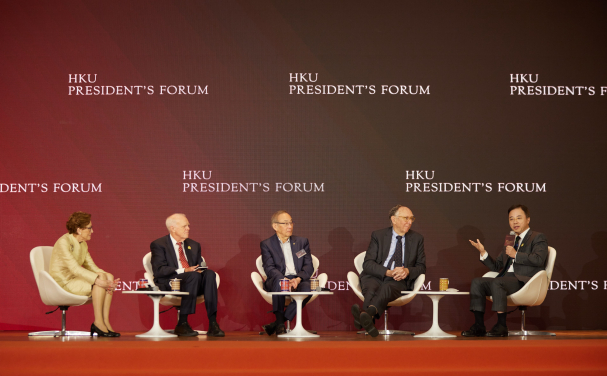At the inaugural HKU President's Forum held today (April 3) at Loke Yew Hall, the University of Hong Kong (HKU), four pioneering scientists and Professor Xiang Zhang, the President and Vice-Chancellor of HKU and convenor of the Forum, stressed the crucial role science will play in safeguarding the future of humanity and tackling pertinent global issues including climate change, sustainable growth and aging populations.
The renowned speakers were Professor Dame Carol M Black, a respected clinician and UK government advisor; Professor Steven Chu, Nobel Laureate in Physics and former Secretary of Energy of the US government; Dr Jack Dangermond, an environmental scientist and creator of the Geographic Information Systems (GIS) that have been applied to almost every field of human activity; and Professor John Hennessy, a former President of Stanford University, pioneer in computer architecture and winner of the Turing Prize, the Nobel Prize equivalent in computing.
Professor Chu, a passionate advocate for clean energy, spoke on the progress made in his own laboratory and other companies in the States on reducing carbon emissions, and enhancing the use and storage of renewable energy – in alignment with the global goal to achieve carbon neutrality by 2060. He said universities can play an important role in trying to work with the government on the most efficient policies that create the least political resistance, as "scientists and engineers might not be the most astute at determining that". He also supports helping poorer nations gain access to technology that can fuel their economic growth, noting that: "I think the richer countries should and must help the poorer countries in responding to their changing climates. They do have an obligation."
Professor Black is adamant in using her knowledge to influence government policy-making for social good, regardless of pressure from the opposition or powerful lobbyists. She had made recommendations to the UK Government on a range of issues including mental health, drug use, workforce, young people and inadequate aftercare. Her long years of research has uncovered the causes and treatment for the potentially fatal disease of systemic sclerosis. Three decades of research work, she noted, has shown "how basic science, technology, healthcare infrastructure and effective collective effort can transform the most lethal complication of the most lethal rheumatic disease."
Dr Dangermond exalted the transformation technological advancement has brought to the world. As a result of the Internet and other developments, our world today is complex and interlocked, resembling a kind of eco-system. Yet sustainable growth remains a huge challenge, as the threats of overpopulation, climate change, fragile ecosystem loom. He emphasized the importance of cross-discipline, cross-sector collaborations in creating a sustainable future. "The rapidly emerging Global Geospatial Infrastructure will profoundly transform how we manage our world," he noted.
Professor Hennessy, a driving force behind artificial intelligence (AI), believes in the contributions AI can make in further improving human lives. Self-driving cars will certainly become reality, alongside other developments resulting from breakthroughs in deep learning, such as detailed image analysis.
In response to the issue about whether AI will become smarter than humans and the potential loss of jobs from its widespread adoption, Professor Hennessy remarked: "Our obligation as a society is to help train people so that they can use this new technology, take advantage of it and find useful and gainful employment," he added. He also insisted that humans still have an important role to play in ensuring proper analysis or diagnosis, e.g. in critical medical cases. "Having critical thinking is important," he said.
HKU President Professor Xiang Zhang echoed the importance of collaboration in tackling global issues: "Let us keep the realm of sciences and technology as open, accessible, and non-partisan as possible, despite the increasing geopolitical tensions that we cannot ignore."
"I believe firmly that the right approach to new scientific development should be neither overwhelming pessimism nor optimism, but instead, techno-pragmatism: pragmatism when it comes to new knowledge, is absolutely vital in unlocking the multilateral, multi-stakeholder solutions to global challenges."
Also, he stressed the key role a cosmopolitan city with global networks like Hong Kong plays in driving forward innovation and technological growth, and the key part HKU plays in relation to that.
An archive of the Forum on Youtube: https://www.youtube.com/live/fa1eMn2kf2U?feature=share
RTHK 32 (TV channel) will rerun the Forum at 2pm, April 8, Saturday.
Please click here for more photos and short videos of the Forum.







